
In this edition of “I Wake Up Streaming,” novelist William Boyle rounds up his top streaming picks for the month of March. The column’s name is a play on the 1941 film I Wake Up Screaming, starring Betty Grable, Victor Mature, and Carole Landis. While the film’s title hits a pleasing note of terror and despair, changing that one letter speaks to the joy of discovering new films and rediscovering old favorites, as well as the panic that comes with being overwhelmed by options.
Romance & Cigarettes (Tubi)
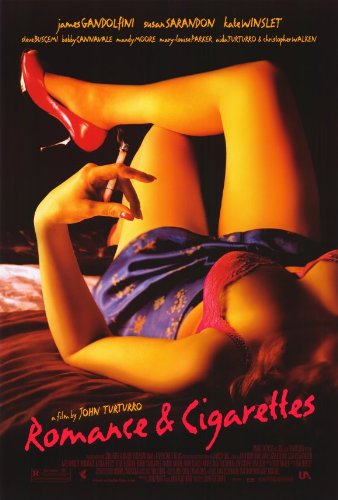
Truth is that my movie watching has been off to a slow start in 2024 because I undertook yet another rewatch of The Sopranos in honor of the twenty-fifth anniversary of its premiere. It was my most rewarding rewatch yet (it’s certainly one of my four favorite shows of all time, up there with Twin Peaks, Deadwood, and The Wire), and I considered turning this month’s column into a list of my favorite episodes and then I had second thoughts. Since I’ve discussed David Chase’s Not Fade Away and The Many Saints of Newark in previous installments, I decided I’d kick this one off with something Sopranos-adjacent, John Turturro’s 2005 weirdo genius musical, Romance & Cigarettes. James Gandolfini plays Nick Murder, a guy who works on bridges and is married to Susan Sarandon’s Kitty. They have three daughters—played by Mary-Louise Parker, Aida Turturro, and Mandy Moore—who are in some sort of backyard band with Bobby Cannavale’s Fryburg. Nick is having a torrid affair with Kate Winslet’s Tula, who works in a lingerie shop called Agent Provocateur, and his life is in upheaval—things are bad at home, he wants a circumcision to appease Tula, he’s facing down his mortality. Also entering into the proceedings are his pal Angelo (Steve Buscemi—that’s three Sopranos alums), his mother (Elaine Stritch, in one of the film’s most memorable scenes), and Christopher Walken (a bonkers, hilarious turn as Uncle Bo). The way music is used in the film recalls Herbert Ross and Dennis Potter’s Pennies from Heaven, as characters sing along to the soundtrack. As with much of Turturro’s directorial output, it’s tonally wild—a surreal, sincere sex romp that’s by turns farcical and grave. It’s a beautifully insane film—certainly not for everybody—but if you’re on its wavelength, or it’s on yours, it’s something you won’t soon forget.
Youth Without Youth (Criterion Channel)
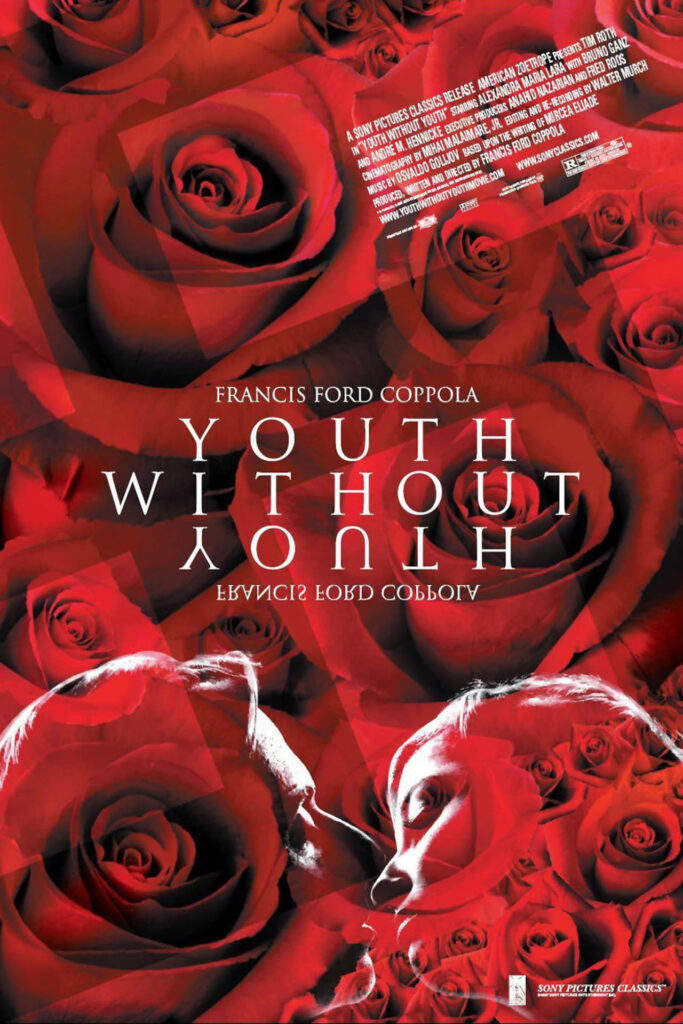
I saw a review on Letterboxd yesterday that insisted Francis Ford Coppola stopped making good movies after the ’70s, and I got steaming mad. To say this about Coppola’s work reveals a level of naivety that’s astonishing. Some of my favorites of all of his films—Rumble Fish, The Outsiders, One from the Heart, Tucker: The Man and His Dream, the underrated third installment of The Godfather (much improved in its recent restoration as The Godfather Coda: The Death of Michael Corleone), and Bram Stoker’s Dracula—came out in the ’80s and early ’90s. He made inspired choice after inspired choice, following his interests. It strikes me that Coppola is a lot like Bob Dylan in this regard—there are those who wish to ignore or belittle his post-1978 output and, as with Dylan, that’s when some of his most exciting, inventive, and heartfelt work was created and released. Admittedly, the mid ’90s were tough on Coppola (in a way they weren’t on Dylan). Jack with Robin Williams (1995) was both a critical and commercial flop. He bounced back with 1997’s The Rainmaker and then took an extended hiatus during the late ’90s and early ’00s as his daughter Sofia Coppola’s directorial career blossomed. But then Coppola came back reinvigorated and made some of his most vital and neglected films: Youth Without Youth in 2007, Tetro in 2009, and Twixt in 2011. I saw them all when they came out and liked them very much. This was my first time revisiting Youth Without Youth since its release (it’s on the Criterion Channel as part of its 100 Years of Columbia Pictures retrospective), and this time around, I found it to be extraordinary. Tim Roth plays Dominic Matei, an elderly language scholar in 1930s Romania who is struck by lightning and ages backwards from seventy to forty. As time passes, he realizes he has been endowed with vast powers of memory and comprehension, and the Nazis attempt to apprehend him for experiments because they believe electric shocks are a sort of fountain of youth. Matei flees and assumes a new identity. Years pass, and his life is altered again when he chances across a young woman who has also been struck by lightning and shaken into a new reality. Youth Without Youth is a gorgeous and aching meditation on time and memory and the soul. It’s so beautifully conceived and photographed in a classical sense that it makes new stuff these days look like garbage. In my estimation, it’s an unheralded late masterpiece from Coppola (that’s not for everyone, based on its reviews). Tim Roth is wonderful. I haven’t read the novella by Romanian philosopher and historian of religions Mircea Eliade on which it’s based, but I need to correct that soon. Also, I can’t wait for Megalopolis.
Small Pond (Tubi, YouTube, VUDU)
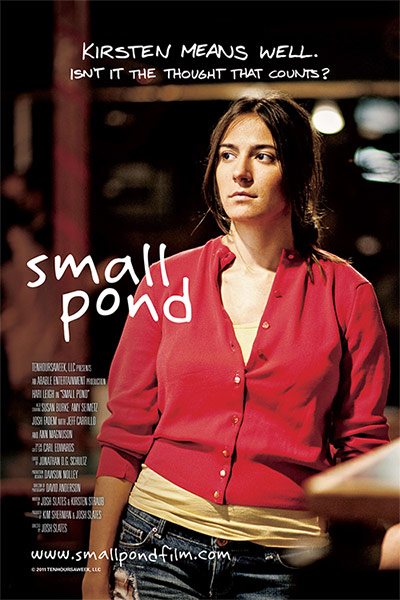
I’m so glad I stumbled across this 2012 gem on Tubi. Directed by Josh Slates and written by Kirsten Straub and Slates, it beautifully captures a certain type of experience—being stuck living in a university town, that lost and confused in-between time—with tons of humor and heart and grace. Hari Leigh’s a total goddamn revelation as Kirsten, giving one of my favorite comedic performances in recent memory. Kirsten, in her early twenties, skips around from the pizza shop where she works to the dive bars she frequents, has it out with her highly organized and driven housemate (the great Amy Seimetz as Katie), passes out drunk, has meaningless one-night stands, makes bad decision after bad decision, and yearns for a life that seems to have escaped her. Small Pond feels like a spiritual heir to a certain kind of ’90s indie movie (Steve Buscemi’s Trees Lounge and Hal Hartley’s early stuff jump to mind). It’s shaggy, loose, and was obviously made by a bunch of pals with love. It’s also the perfect length—seventy-six minutes—and features some good music.
The Loss of Sexual Innocence (Tubi)
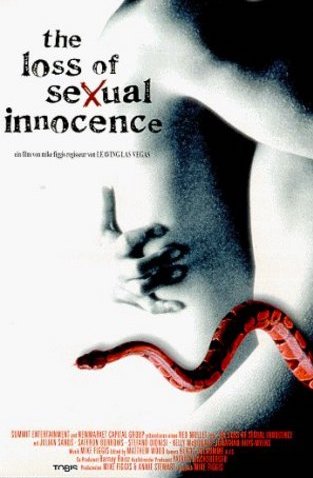
Late last year, I went on a Mike Figgis tear. The Loss of Sexual Innocence (1999) turned out to be a revelatory first-time watch. I remember avoiding it when it came out because it was getting trashed. Probably for the best. Even though I loved Leaving Las Vegas, Internal Affairs, and Stormy Monday, I would’ve hated this in my early twenties. Figgis is working in Terence Davies and Terrence Malick territory here. It feels like his version of what Malick did in The Tree of Life over a decade later: a deeply personal reckoning with existence itself. I thought a lot about Davies’s trilogy of short films, as well as Distant Voices, Still Lives and The Long Day Closes. I also had a thought that what Figgis is doing in The Loss of Sexual Innocence is like some bizarre mix of Davies and Tinto Brass. That shouldn’t work, but it does. I found so much about it utterly compelling. The interplay of memory and dreams and myth. The Kelly Macdonald sequences are stunning, as are the “Her Dream” and “His Dream” vignettes. Julian Sands and Saffron Burrows are terrific. It’s structured like a linked story collection. I thought of Ernest Hemingway more than once—In Our Time, “The Short Happy Life of Francis Macomber,” and The Garden of Eden especially. Near the end, there’s an unforgettable chapter called “Justice”—I won’t shake that anytime soon. The title of the movie is terrible, that’s true—something like The Garden of Eden (snagging it from Hem) would’ve worked, but I’m sure there are other, even better options à la Davies’s shorts. As always, Figgis uses music so effectively. Truly surprised by how much I loved this.
Catch the Fair One (Hulu)
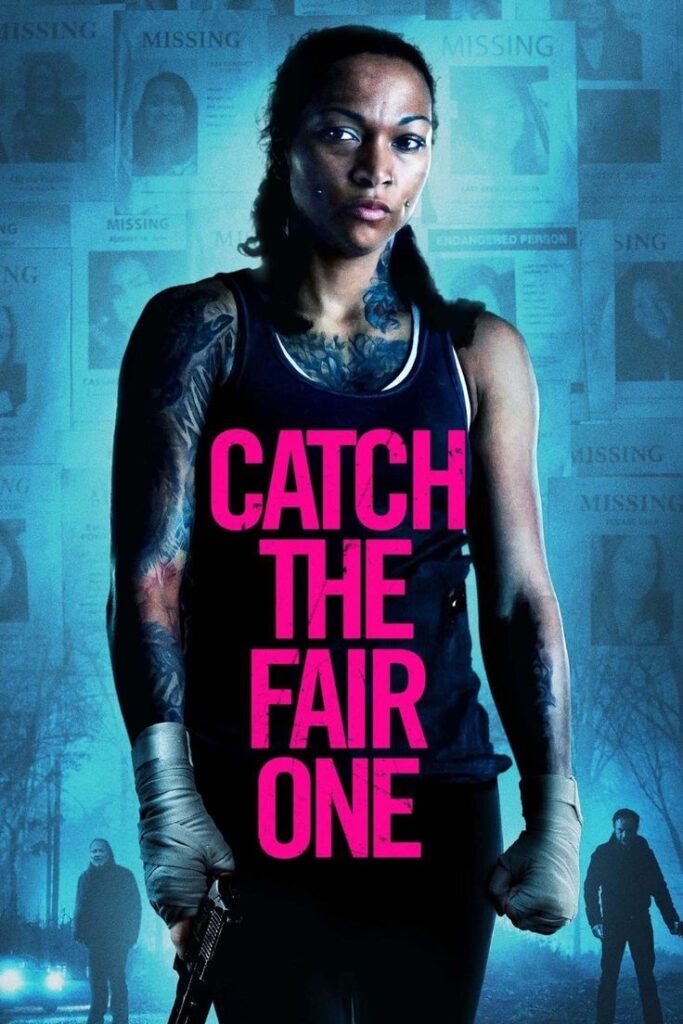
I enjoyed True Detective: Night Country—I like writer/director Issa López a lot and Jodie Foster’s great, of course, but Kali Reis was the real revelation. I went back and watched this, her acting debut from 2021 following a celebrated run as a pro boxer. Given the nature of the story—Reis plays a Native American woman and former professional boxer who goes undercover in the sex-trafficking underworld of upstate New York to find her missing sister—it’s an extremely tough watch at times but a great and necessary one, and Reis is flat-out terrific. She has an incredible screen presence. This one will stay with me. I can’t wait to see what Reis does next.
William Boyle is the author of the novels Gravesend, The Lonely Witness, A Friend Is a Gift You Give Yourself, City of Margins, and Shoot the Moonlight Out. His novella Everything Is Broken was published in Southwest Review Volume 104, numbers 1–4. His website is williammichaelboyle.com.
Illustration: Jess Rotter
